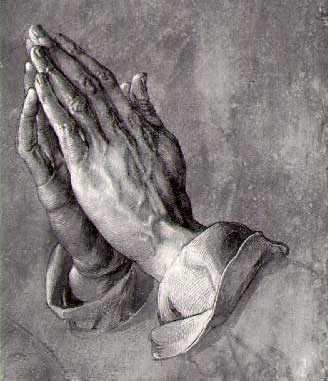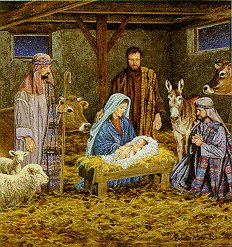“Seek the Lord while he may be found; call on him while he is near. Let the wicked forsake his way and the evil man his thoughts. Let him turn to the Lord and he will have mercy on him, and to our God for he will freely pardon.” ~Isaiah 55:6-7.
 The disciples asked Jesus in Luke 11 to teach them how to pray. They want to be like him in every way. So they want to pray just like him, too. They want to identify with their rabbi and to be identified with their rabbi by praying like him. So Jesus gives them the basics as far as the words go and then he tells them a story so they don’t lose the big picture.
The disciples asked Jesus in Luke 11 to teach them how to pray. They want to be like him in every way. So they want to pray just like him, too. They want to identify with their rabbi and to be identified with their rabbi by praying like him. So Jesus gives them the basics as far as the words go and then he tells them a story so they don’t lose the big picture.
The parable of the persistent friend. It’s midnight, the guy’s in bed, his whole family’s asleep. He doesn’t want to get up and get his friend the bread he needs to feed his surprise guest. In fact, he tells the neighbor at the door it’s not going to happen.
“Hey, it’s late! We’re all in bed! The kids are going to school in the morning! I’ve got an early meeting at work! Buzz off!”
In Jesus’ story, the man does get up and give his neighbor the bread he desperately needs. But not because he wants to. He does it, Jesus says, because of the friend’s boldness or persistence. And I’ve heard this story traditionally interpreted like this: keep praying. Even if God says ‘no,’ keep praying. He’ll give in eventually if you keep praying. Keep bugging him. He’ll change his mind. He doesn’t want to give you this thing you’re asking, but he will if you just keep knocking.
For that to make sense, God has to be the guy in the bed. For that interpretation to hang with the story, the guy in bed is God. The guy in bed. The guy who’s already turned out all the lights. The guy who’s locked his door. The guy who’s only thinking of himself. The selfish guy who doesn’t want to get up from under the covers and give his neighbor what he needs. That guy represents God?
No way.
If Jesus had put God in this story, all the lights would be on in the house. All the doors and windows would be wide open. There would be huge search lights criss-crossing the sky and giant neon billboards with flashing arrows pointing to the house saying, “Get your bread right here! Get as much bread as you want right here! And it’s free!” You couldn’t even get to the door to knock because the man would be out in the street looking for you and running to meet you and give you the bread before you could even ask.
The guy in the bed is not God. The guy in the bed is the opposite of God. And there’s the point. There’s the teaching of Jesus. He’s drawing a stark contrast. He’s not making a comparison. Jesus says here’s a man who will eventually get out of bed and give bread to his neighbor, if not because they’re friends, then certainly out of a sense of duty or honor or hospitality. You fathers, if your child asks you for something he really needs, you’re not going to give him something that would hurt him. So if this reluctant sleepy guy and you imperfect human dads know how to provide good gifts, why would you ever assume that God doesn’t? Our God is definitely more kind and generous and loving and giving than any man, regardless of how decent or good that man may be.
Jesus’ point in telling the story in Luke 11 is that our God is never reluctant to help. We ask God knowing he’ll honor our requests. We seek God knowing we’ll find him. We knock on God’s door knowing he’ll give us what we need.
“This is the confidence we have in approaching God: that if we ask anything according to his will, he hears us. And if we know that he hears us — whatever we ask — we know that we have what we asked of him.” ~1 John 5:14-15
~~~~~~~~~~~~~~~~~~~~~~~~~~~~~~~~~~~~~~~~~~~~~~~~~~~~~~~~~~~~~~~~~~~~~~~~~~~~~~~~~~~~~~
 With 6:23 to play in the third quarter of last night’s Fiesta Bowl, Oklahoma scored a touchdown to pull to within five points of West Virginia. By this point the Mountaineers had proven clearly that they were the faster, more athletic, more explosive team. And by kicking an extra point, the Sooners would only be down by four with some real positive momentum. Maybe even some potentially game-changing momentum.
With 6:23 to play in the third quarter of last night’s Fiesta Bowl, Oklahoma scored a touchdown to pull to within five points of West Virginia. By this point the Mountaineers had proven clearly that they were the faster, more athletic, more explosive team. And by kicking an extra point, the Sooners would only be down by four with some real positive momentum. Maybe even some potentially game-changing momentum.
But Bob Stoops decided to go for two. The pass was incomplete. And OU trailed by five. Not only that, but instead of feeling good about a success, the team felt bad about a failure. Instead of West Virginia feeling negatively about their failure in giving up a touchdown on a long drive, they felt positively about their success in stopping the two-point play.
Momentum is huge. The psychology of what happens in the course of a football game and how it all shifts back and forth at a moment’s notice is generally tied to turnovers and failed two-point conversions.
And then, to defy logic even further, Stoops calls for an onside kick. Halfway through the third quarter. West Virginia recovers at the OU 39 yard line and goes on to score three of the game’s next four touchdowns to salt it away.
It was like Stoops thought he was playing OSU or something.
If I were the owner or GM or AD of a football team, I would put it in my coach’s contract that he could never, ever, go for two before the start of the fourth quarter. Period. No exceptions. I don’t care how far we’re down or how lousy our kicker. Going for two, going against the percentages, unnecessarily risking that precious momentum, it doesn’t add up. It’s never worth it.
Someday we’ll discuss “the chart.”
~~~~~~~~~~~~~~~~~~~~~~~~~~~~~~~~~~~~~~~~~~~~~~~~~~~~~~~~~~~~~~~~~~~~~~~~~~~~~~~~~~~~~~
 Finally, my good friend Todd Lewis, down in Marble Falls, sent me a Christmas article he wrote last month exploring the ways the Christmas season produces cheer even in the midst of war, disease, and crime. His words go right to the heart of what we preached here at Legacy for the past three weeks, how we see ourselves in the infant Jesus — God’s intentions in creating us, our own potential, our high calling. Click here, Observations on Christmas Cheer, to read Todd’s excellent article.
Finally, my good friend Todd Lewis, down in Marble Falls, sent me a Christmas article he wrote last month exploring the ways the Christmas season produces cheer even in the midst of war, disease, and crime. His words go right to the heart of what we preached here at Legacy for the past three weeks, how we see ourselves in the infant Jesus — God’s intentions in creating us, our own potential, our high calling. Click here, Observations on Christmas Cheer, to read Todd’s excellent article.
Peace,
Allan
Leave a Reply